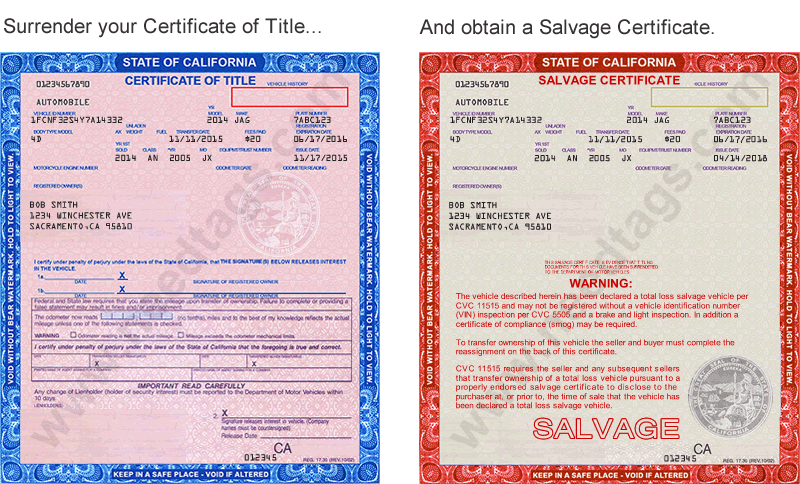Do I Have To Get a Salvage Certificate If My Vehicle Is a Total Loss?
Find the answers you need to get your California Vehicle Registration faster.
Do I Have To Get a Salvage Certificate If My Vehicle Is a Total Loss?
Yes. It is California DMV requirement to file for a Salvage Certificate or Nonrepairable Vehicle Certificate after a total loss.
An insurance company that makes a settlement with a policy holder and takes possession of a vehicle which is declared a total loss or non-repairable must report and obtain either a California Salvage Certificate or California Non-repairable Vehicle Certificate within 10 days from the date of the settlement, as required per California Vehicle Code (CVC) 11515 & 11515.2.
If the vehicle owner retains possession of the total loss or salvaged vehicle, the insurance company must notify the DMV of that retention and advise the owner of his or her responsibility to obtain a Salvage Certificate or Non-repairable Vehicle Certificate within 10 days from the date of the settlement.
You will not be able to continue paying registration renewal fees. If your insurance company has reported the vehicle as a total loss, the DMV will no longer mail you renewal notices. If you attempt to pay for your renewal online or in-person, the DMV will notify you of a Total Loss or Salvage record on file. You must obtain either a Salvage Certificate or Non-repairable Certificate in order to legally possess the vehicle.
A violation of CVC 11515, when the total loss vehicle is not subject to an insurance settlement, is an infraction, except that, if committed with the intent to defraud, the violation is a misdemeanor. A violation of CVC 11515 is a misdemeanor when a vehicle is subject to total loss insurance settlement or a salvage insurance settlement. For all practical purposes, not filing the proper Salvage Certificate or Nonrepairable Certificate in a timely manner is a crime in California. The intent of the law is to stop vehicle owners from selling salvage, total loss, and non-repairable vehicles as clean title, potentially putting buyers at risk.
So the real question becomes, who considers the vehicle a total loss?
Well, that would be the insurance company, or you, with the help of an independent (perhaps costly) appraiser. The best option in these types of circumstances, when you do not agree with the insurance company's decision on a total loss outcome, is to negotiate with the adjuster. The chances they stick to their original find is high, but it's really the simplest way to try and keep your vehicle's clean title. It should be noted, most often vehicle owners will negotiate a better price for their totaled vehicle not to stop a total loss recording but rather to get more cash in hand for their next purchase. Once an insurance company determines a vehicle a total loss, especially if due to extensive damage, a reversal is not likely and it's best to negotiate on terms of profitability for you, the vehicle owner. Provide your insurance adjuster with independent repair estimates and comparable vehicle sales prices.
What is a Total Loss Salvage Vehicle?
A total loss or salvage vehicle is described as a vehicle that has been damaged, wrecked, or destroyed to the extent that the insurance company or owner considers it uneconomical to repair.
There are several different types of vehicle branding as defined by the CA Department of Motor Vehicles (DMV). The main four are:
- Salvaged - A vehicle which has been damaged, wrecked or destroyed to the extent that it is considered too expensive to repair.
- Revived salvage - A salvage vehicle which has been repaired and after passing safety inspection, registered with DMV as operable.
- Junk vehicle - A vehicle that has been reported to the DMV as being dismantled by the owner or a certified dismantler.
- Nonrepairable vehicle - A vehicle that has no resale value except as a source of parts or scrap metal. Examples: 1. A surgically stripped vehicle recovered from theft. 2. A vehicle completely burned to the extent that there are no usable or repairable body or interior components. 3. A vehicle that by the declaration of the owner, irreversibly, is designated as solely a source of parts or scrap metal. Note, a nonrepairable vehicle cannot be titled or reregistered once it is issued a California Nonrepairable Vehicle Certificate.
I want to keep my total loss vehicle. What do I need to do next?
Assuming you've made a deal with your insurance company to keep your vehicle as part of a settlement agreement, the process of registering the vehicle with the DMV as salvaged is fairly simple. Just keep in mind, the Salvage Certificate issuance process does not allow for operation of your vehicle just yet. It is simply a notification to the DMV that you will retain possession of your vehicle, even though it has been declared a total loss, and may in the future repair it for use, sell for junk, or keep for any reason, having the ability to revive the vehicle to operational status at any time. Please note, if you by mistake file DMV paperwork to convert the vehicle's title to "Non-Repairable", you will not be allowed to drive the vehicle or convert the title to salvage in the future. The vehicle will always remain nonrepairable. Make sure you file for a Salvage Certificate and not a Nonrepairable Certificate if you intend on driving or registering the vehicle for public road use at a later date. These two certifications/branding are very different and specific.
How do I get a California Salvage Certificate?
So you've decided and agreed upon keeping your total loss vehicle. The process requires that you surrender your vehicle's original California Certificate of Title, and in turn, receive a Salvaged Certificate. These two documents are very high in contrast to each other as to make clear to potential buyers that the vehicle does not have a clean title and is branded as salvage. The process of converting an ordinary vehicle title to a salvage certificate is handled by the California DMV or private vehicle registration office (BPA).

To apply for a Salvage Certificate, submit the following to the DMV or BPA office:
- A completed Application for Salvage Certificate or Nonrepairable Vehicle Certificate (REG 488C).
- Proof of ownership with a properly endorsed:
- Certificate of title, or
- Application for Duplicate or Paperless Title (REG 227).
- Odometer disclosure (if not declared on title certificate).
- License plates. (or explanation of disposition on the application).
- Vehicle verification, if the vehicle has an out of state title.
- $21 Salvage Certificate fee payment.
I'm ready to get my salvage vehicle back on the road. What do I have to do?
If you've decided to have your vehicle repaired and would like to learn about the salvage revive process, or perhaps you're already done with repairs and are ready to get back on the road, the next step you'll need to take involves obtaining a vehicle safety inspection and surrendering your Salvage Certificate for a Salvage Title through the California Department of Motor Vehicles or authorized vehicle registration service office. We explain the process of reviving a salvage or total loss vehicle in detail below.
How To Revive a Total Loss or Salvage Vehicle
The process is basically the reverse of the above except in exchange for your Salvage Certificate you will receive a Certificate of Title with "Salvage" branding... and get your vehicle back on the road again.
Related Material
Online Vehicle Title Transfer (CA-to-CA)
California Title Transfer Quick Guide
California Smog Check Requirements
Commonly Used DMV Forms



